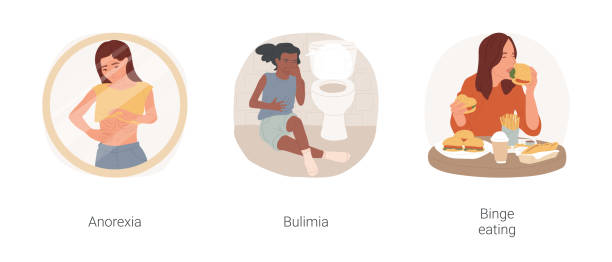081-4797-7173
Eating disorders are complicated mental health illnesses defined by disorganized eating habits and an obsession with body weight and shape. They can be identified by a chronic disturbance of eating or eating-related behavior that changes food consumption or intake and severely compromises physical health or psychological well-being.
Types of Eating Disorders

1. Anorexia Nervosa: This condition is characterized by a strong fear of gaining weight, which leads to restricted eating habits and a distorted body image. This can lead to severe thinness, lack of nutrition, and a variety of health problems.
2. Bulimia Nervosa: Bulimia is characterized by periods of overeating that are followed by compensatory behaviors such as vomiting, excessive exercise, or laxative usage. This pattern of overeating and purging can be harmful to one’s physical and mental health.
3. Binge Eating Disorder (BED): This is characterized by consuming huge amounts of food in a short period of time, typically quickly and to the point of pain. Individuals with BED, unlike those with bulimia, do not participate in frequent compensatory behaviors, which can lead to obesity and other health problems.
4. Avoidant/Restrictive Food Intake Disorder (ARFID): This is a type of eating disorder in which the individual avoids particular foods or food groups and is hesitant to try new foods. This excludes anxiety about bodily shape or size. This condition can result in poor nutrition and reduced social functioning.
5. Pica: This is the repeated consumption of non-nutritive things such as dirt or paper.
6. Rumination Disorder: This is characterized by repeated vomiting of food, which may be re-chewed, re-swallowed, or spit out.
Causes of Eating Disorders

1. Psychological Factors
Eating disorders can be caused by issues such as low self-esteem, dissatisfaction with one’s body, perfectionism, and difficulties coping with emotions or stress. Trauma, abuse, and other life stresses might also contribute to their start.
2. Biological Factors
Genetics, neurotransmitter imbalances, and hormone imbalances can all play a part in the development of eating disorders. Individuals having a family history of such diseases may be predisposed to them.
3. Sociocultural influences
Pressures from the media or social circles to achieve a certain body shape, weight, or beauty standards might contribute to the development of eating disorders.
Importance of Early intervention
1. Long-term Consequences Prevention: Early detection and management can help avoid the development of eating disorders. It can also help to avoid physical and psychological problems like starvation, organ damage, electrolyte imbalances, and co-occurring mental health conditions.
2. Psychological well-being: Addressing eating disorders early helps reduce the psychological consequences, such as depression, anxiety, and social isolation.
3. Improving therapy Efficacy: Intervening early raises the chances of successful therapy and long-term healing. It enables the use of complete treatment methods such as psychotherapy, nutritional counseling, and medical support.
4. Addressing Underlying Issues: Early intervention allows for the identification and treatment of the root causes that contribute to the development of eating disorders, such as emotional distress, trauma, or dysfunctional coping strategies.
5. Education and Awareness: Early intervention allows for increased education and awareness, improving understanding and empathy for persons suffering from eating disorders. Education equips communities to notice warning signs, support afflicted individuals, and foster a culture of body positivity and mental well-being.
Understanding the numerous types of eating disorders, their complex causes, and the crucial significance of early intervention is critical for establishing a society that fosters mental health, empathy, and support for people impacted by these difficult situations.
0






